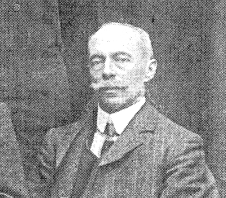
Major Duhan in 1910

Major Harry Taylor Duhan was the 1907/1908 Durban champion. It appears
he won the 1907 event and that there was no tournament in 1908. When
Lucas Bull stopped his column in "The Natal Advertiser" it was
taken over by Major Duhan, who continued it until he was transferred from
Durban to Pretoria in the middle of 1910, when the chess column was
discontinued. Later in 1910, Major Duhan was the surprise winner of
the South African championship, held that year in Cape Town. His score
was 11/14 (11 wins, 3 losses), just ½ ahead of Cameron and Siegheim,
and he won £40 as first prize.
Major Duhan defended his title in a match against Siegheim in 1911,
and was comprehensively defeated by 6½ to 1½ points. He also
played in the 1912 South African championship, held in Johannesburg,
but could only score 5 points out of 9.
According to Len Reitstein's book "A History of South African Chess"
Major Duhan was a professional soldier who came to South Africa towards the
end of the Anglo-Boer War. Reitstein incorrectly believed that he was born
in Bedford, England, but was unable to discover much about Major Duhan.
Subsequent research by myself in the online archive of The Times
indicates that he was born into the Duhan family from the East Indies
(now called India and Pakistan), where his father Harry Reilly Duhan was a Civil
Servant. The index of British Indian Office births says that Harry Taylor Duhan
was born in Mussoorie, Bengal, in 1863. He joined the Army in 1885
as a Lieutenant and served in India until 1891, when he resigned and
joined the Colonial Service as an Assistant Police Commissioner at Pera,
Straits Settlements. Duhan was wounded in late 1895, and sent to London
on sick leave. Whilst in London, he squandered his accumulated salary of
£200 and injury gratuity of £300, and then had to appear in court as his
liabilities of £408 exceeded his assets of £45!
I was interested to find Duhan living at 68 Clapham Road in Bedford on the
1891 census for Bedford East. His father was the head of the household and
the Duhan family was wealthy enough to employ 3 domestic servants. English
chess researcher, Mark McCready, wrote to me about Duhan's time in Bedford
and it seems that Duhan played board 1 for Bedford chess club between 1896
and 1901. His article
on Bedfordshire chess has some interesting content.
The next mention is as Captain Duhan, the prosecutor in the Pretoria
Treason Trial of August 1900. It appears that one Hans Cordua had plotted
to abduct Lord Roberts, the British Commander-in-Chief. The plot failed,
Cordua was court martialled, pleaded guilty and faced the firing squad.
By 1908 Duhan had been promoted to Major, and it is likely he retired in 1913
(Majors usually retired at 45 or 50 in the British Army). However, he returned
to the Army once World War One started. His medal index card (number 72487)
indicates that he served as a Company Sergeant Major (Warrant Officer) at the
Infantry Base Depot of the Cheshire Regiment from early 1915 to the end of 1918,
receiving the Victory Medal and the British War Medal for his service.
Both of his brothers also served in the Army. His younger brother Major Francis
Taylor Duhan was killed in action at Ypres in 1915 (aged 42). His older brother,
William Waugh Taylor Duhan (born 1862), received numerous mentions in the press
and in military records. William was a Colonel in the Royal Artillery regiment
when he retired in November 1918, having reached the age limit.
After the War, Duhan was mentioned in the pages of The London Gazette.
He had again got into financial difficulty, and was placed in receivership
between 1921 and 1923. At the time, he was living at 27 High Street, Bloomsbury,
in the city of London. His brother William was buried in Bedford cemetery in 1928,
and Harry was buried in Bedford in 1929.
This game was played in the 1911 match for the SA championships.
(score from SA Chessplayer 1977)